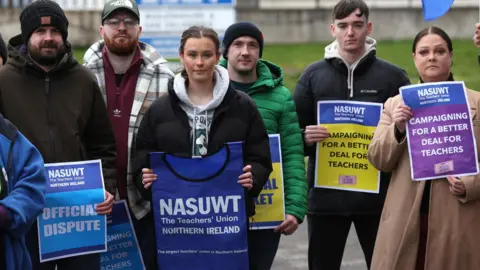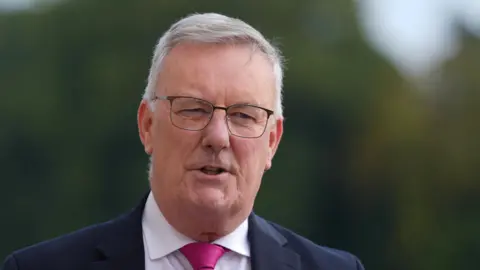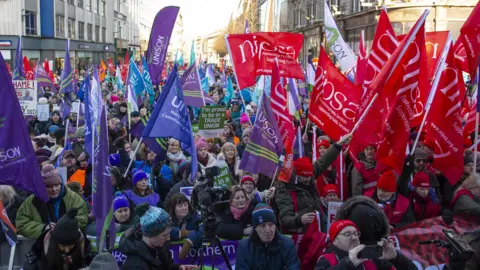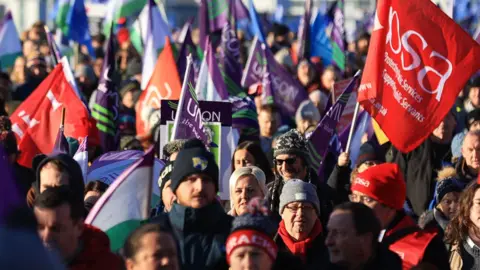Public sector pay back to top of Stormont agenda
 PA
PAPublic sector pay has surged back to the top of Stormont’s agenda with the prospect that teachers could be on strike by January.
Civil servants and NI Water staff could also be heading for industrial action as their unions have made clear that they are unhappy with the pay awards likely to be on offer.
Health workers have been offered an interim deal which would not immediately give them the 5.5% they want.
The issue had been bubbling in the background for months but erupted after Monday’s budget reallocation exercise known as a monitoring round.
 PA Media
PA Media'Extremely regrettable'
It means that ministers now know how much money their departments will have for the rest of this financial year.
This means they can judge how much they can afford to offer for pay rises.
The Health Minister, Mike Nesbitt, immediately said he would not have enough to meet the 5.5% increase recommended by an independent pay review body.
The same recommendation has already been implemented for health workers in the rest of the UK.
‘Budgetary decisions by the executive, including the allocations announced [on Monday], mean there is insufficient funding to maintain pay parity for health service workers," Mr Nesbitt said.
"That is an extremely regrettable position with potentially serious consequences," he added.
The offer he has put on the table would effectively give the unions part of what they want with a commitment to provide the rest if and when the money is there.
A document in front of ministers on Monday, part of which was seen by the BBC, also explained that there was a looming dispute with the civil servants employed by Stormont departments.
Again, a major the issue was the comparison with workers in the rest of the UK.
 EPA-EFE/REX/Shutterstock
EPA-EFE/REX/ShutterstockPay deal negotiations
Civil servants in Whitehall are in line for a pay rise of about 5% while the Finance Minister, Caomihe Archibald, judges that 3% is the best Stormont can manage.
There was also a warning that a 3% offer would be "particularly difficult to defend if awards to other pay groups are materially higher".
Teachers are certainly looking for a deal which is materially higher than 3%.
They have asked for 13.5% which the unions say is needed to make up for a legacy of pay deals which were at or below inflation.
Without an offer on the table from the Department of Education they have already moved to ballot their members for industrial action.
The Education Minister, Paul Givan, said it was "with disappointment" that he received the notification from the unions of their intention to ballot adding that any pay award must be "affordable".
This was a problem foretold and in fact has its roots in the settlement of the last big public sector pay dispute.
That dispute saw about 170,000 people strike in January this year, largely in protest at how their salaries had fallen behind equivalent workers in other parts of the UK.
The pay claims were only settled on the return of devolution, with the UK government giving the new Stormont Executive almost £600m for that purpose.
But using a one-off sum to settle what then becomes a recurring cost was always going to be risky.
As the shape of this plan emerged an economist messaged me to say: "A lump sum amount to settle public sector pay claims? I may just join the circus at this point."
A more considered view was given by the NI Fiscal Council (NIFC) when it analysed Stormont’s budget in May.
It said: "Making use of temporary, one-off funding to initiate recurrent pay settlements causes long-term pressure on the Executive’s finances".
It added that all Stormont departments started the fiscal year facing "an in-built wage-cost pressure" and warned that further strikes could be the result.
The NIFC also said that departments were planning on the basis of 3% pay growth.
But in July the independent pay review body recommended 5.5% for health workers, blowing that plan out of the water.
As negotiations begin ministers now have limited options for defusing the disputes.
The London government is unlikely to be receptive to providing more funding and finding more savings within departments will be difficult.
Mike Nesbitt’s approach looks to be the most plausible: Offer 3% now with promises to make up the difference in future years.
But unions may not be in the mood to go back to their members without the numbers and the timetable being nailed down.

